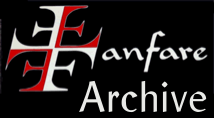Fanfare Contributor Bio
Christopher Brodersen
My parents were both professional artists, and so naturally it was assumed that I would enter the fine arts field as an adult. Instead, I gravitated towards music in junior high, first with the clarinet, and later the piano, cello, and voice. I went on to major in composition at the University of Michigan, only to find out that I had neither the talent nor inclination to be an enfant terrible specializing in weird, atonal music; such was the prevailing taste at the time. After switching first to music theory and then to music history, the early-music bug bit me solidly in the derriere. I joined the wonderful U of M collegium and taught myself to play several period instruments, while continuing my vocal studies. The late 1960s were a heady time to be involved in early music—the pioneering recordings of Nikolaus Harnoncourt and Gustav Leonhardt had begun to appear, and gradually it became clear to me what direction my future musical activities would take.
At the time, an undergraduate degree in music history usually meant a career in academia, but I decided that was not for me. I got bitten by another bug - the harpsichord craze - and visited the workshops of Frank Hubbard and William Dowd with the idea of working for minimum wage in Bean Town. But thanks to a lead from a family friend in Germany, I learned of an apprenticeship in organ building that had become available. In May of 1973, I moved to West Germany to begin working for Klaus Becker in the bucolic little town of Kupfermühle, situated about halfway between Hamburg and Lübeck on the main rail line. I soon got disillusioned with organ building as well. The “factory” aspect bothered me—organs were built on a kind of slow-moving assembly line with individual craftsmen typically confined to one or two tasks; seldom did an individual see an instrument through to completion. I left the workshop after less than a year, and knocked around Germany for another year and a half, eventually finding work with a harpsichord builder.
Back in the States several years later, I got brave enough to hang out my shingle as a harpsichord maker. My instruments gradually gained recognition, and the orders started coming in. Then the Reagan recession hit and the orders dried up completely. I switched to another line of work and never returned to instrument building. As the saying goes, "no regrets." Since then, my life away from work has been filled with music performance, initially as a singer and more recently as an instrumentalist (bassoon and oboe), and I have found that to be very satisfying indeed.
Looking back, the most surprising part of my life story has been my late-blooming career in music journalism. In 1995, I was offered the job of review editor at Continuo, a tiny magazine devoted to early music published in upstate New York. For four years I was very busy keeping a staff of 10 reviewers supplied with CDs, as well as dealing with my own quota of reviews. Every month there were literally hundreds of new CDs to review - this was smack in the middle of the recording boom of the 1990s, when countless small labels were cranking out titles as if there were no tomorrow - which it turns out, there wasn’t.
After Continuo ceased publication in 1999, my journalistic activities were considerably diminished, but they didn’t disappear entirely. I’m proud to say that I was invited to be a contributor to The Third Ear: A Listener’s Companion, published by Backbeat Books in 2002, when editor Alexander Morin called me in desperation after failing to find anyone to cover several of the Baroque "biggies" - Lully, Rameau, Couperin, Scarlatti, and Telemann among them. Lately I have also been a contributor to The Double Reed, the journal of the International Double Reed Society.
My involvement with Fanfare began much in the same way as it did with Continuo - with a letter to the editor. I’m grateful to Joel Flegler for offering me the opportunity to review CDs once again on a regular basis. Let’s hope I don’t disappoint him - or you, gentle reader!





















